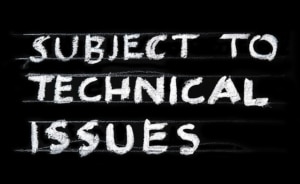Cautionary Tale #11: Counseling Sellers
 “You’re working with the buyer!” It’s not the first time a seller has accused us of such a thing. The implication was that somehow, in building a relationship with the buyer to keep the deal moving forward, we were compromising our job in representing the seller. This narrow-minded view can’t be held by anyone serious about a successful sale of a business.
“You’re working with the buyer!” It’s not the first time a seller has accused us of such a thing. The implication was that somehow, in building a relationship with the buyer to keep the deal moving forward, we were compromising our job in representing the seller. This narrow-minded view can’t be held by anyone serious about a successful sale of a business.
Something we say over and over is that delays can kill deals. One of the most obvious ways those delays happen are buyers who are not convinced of the importance of momentum. As brokers it’s our job to be helpful and friendly (we’ve often been called coaches) and that helpful and friendly attitude isn’t just for our clients, it’s for everyone in the transaction, including accountants, lawyers, and spouses.
A business transaction is not a sprint, it’s a marathon, and those who’ve run marathons can tell you that a big part of the mental battle is trying to stay on an even pace the entire time. Run too fast early on and you might hit a wall early too. Run too slowly, and you end up bleeding time off that you could easily have banked into a better run time. The emotion involved in a business transaction, often one of the most monumental of anyone’s life, requires a general calm friendliness all the way through.
If brokers are “too friendly” with a buyer, it’s not because they are trying to cheat you. It’s because they’re trying to get you to the finish line. After all, the price of the sale has been fixed, as has the commission.
***
A bank recently rolled out an advertising campaign: “Surprises: great for parties, bad for banks.” We agree, though we would say that surprises are not just bad for business transactions. On more than one occasion a last-minute surprise has killed a deal.
A close call we had in the past year involved a seller who had really screwed up the tax planning part of the transaction. He had:
- Put two different businesses within the same entity
- Had not bothered to keep the separation clean and efficient
- Failed to disclose this problem
So he brought it up just prior to the closing day. Needless to say this surprise focused everyone and because the business was solid (despite the seller being incompetent on this issue) the buyers were willing to pay up to $200k of the anticipated tax liability to get the deal over the line. This compromise was able to happen in large part because of what we alluded to above: we had developed a relationship with the buyer as well as the seller. The seller could see we had been surprised as well and knew that we wanted to work in good faith toward a solution that worked for everyone.
This particular surprise didn’t end up crashing a deal, but it very well could have.
As we say early on in the transaction process: tell us everything, even if you don’t think it’s important. And the important stuff? Tell us that first.
Thinking about selling a business but not sure you’ve got the right mindset for it yet? Let us walk you through what you need to do to prepare so that when it is time, it’ll be smooth sailing.

 In our
In our  With a title like “Manage Your Attorney” in a series called “Cautionary Tales” you might wonder if we are teeing up that line from
With a title like “Manage Your Attorney” in a series called “Cautionary Tales” you might wonder if we are teeing up that line from  Often in this series we only have one
Often in this series we only have one  There’s obviously a lot more than seven ways to wreck anything in life, not just business transactions. But over the years, we have seen some particular situations come up over and over again that need to be highlighted. We’ve divided them into things to keep in mind before the transaction begins and during the transaction.
There’s obviously a lot more than seven ways to wreck anything in life, not just business transactions. But over the years, we have seen some particular situations come up over and over again that need to be highlighted. We’ve divided them into things to keep in mind before the transaction begins and during the transaction. We all make mistakes in business. Sometimes it costs us money immediately, other times in the long term. In the worst cases, all the way through and including the sale of your business. Particularly when an owner is ready to sell and is in the mindset of “cashing out”.
We all make mistakes in business. Sometimes it costs us money immediately, other times in the long term. In the worst cases, all the way through and including the sale of your business. Particularly when an owner is ready to sell and is in the mindset of “cashing out”. Whenever we discuss commonalities in successful transactions, inevitably “clean books” will be one of the first three things mentioned. Numbers don’t just matter for your
Whenever we discuss commonalities in successful transactions, inevitably “clean books” will be one of the first three things mentioned. Numbers don’t just matter for your  As brokers, we can dispense business advice but often we have to give life advice as well. We could see that the two incoming owners had a “know-it-all attitude”. You can gently try to offer some correctives, but at the end of the day, it’s their life and their business to do with as they wish. But from the get-go, the outgoing owners and the entire company saw that attitude on display.
As brokers, we can dispense business advice but often we have to give life advice as well. We could see that the two incoming owners had a “know-it-all attitude”. You can gently try to offer some correctives, but at the end of the day, it’s their life and their business to do with as they wish. But from the get-go, the outgoing owners and the entire company saw that attitude on display. One important reason you hire a broker to help you sell your business is the addition of a person to the transaction who is not emotionally tied to the business. We are there as your representative – to make sure you get the best deal possible at the time you are listing your business. And sometimes that advice will be to walk away from a transaction if we don’t think everything lines up in your interests.
One important reason you hire a broker to help you sell your business is the addition of a person to the transaction who is not emotionally tied to the business. We are there as your representative – to make sure you get the best deal possible at the time you are listing your business. And sometimes that advice will be to walk away from a transaction if we don’t think everything lines up in your interests. Some time ago, we had a seller who had a wildly profitable business in medical equipment. He was one of the first to market, and as such had a great competitive advantage and enviable cash flow. In fact, when we first took on his business, he had several serious offers, one as high as $12M.
Some time ago, we had a seller who had a wildly profitable business in medical equipment. He was one of the first to market, and as such had a great competitive advantage and enviable cash flow. In fact, when we first took on his business, he had several serious offers, one as high as $12M.